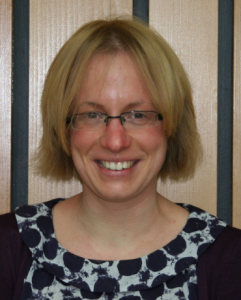What is MND
Find support
I have MND
I am supporting someone
Get involved
Research
About MND Scotland
What’s new?
© MND Scotland 2024
© MND Scotland 2024

From communicating and travelling, to eventually breathing and swallowing, people diagnosed with MND sadly face difficult challenges in every aspect of their lives. On top of this, people with MND often live in remote areas, meaning that access to regular catchups with their health specialists are less frequent, or that long journeys into clinic are required.

With co-team lead, Professor Christopher McDermott, as well as valuable input from people living within MND across Yorkshire, the team have successfully developed a potentially life changing prototype app called ‘TiM’, (Telehealth in MND), which allows people with MND and their carers to monitor their condition at home.
We recently spoke to Dr Hobson, to learn more about Telehealth in MND, her experience as a woman working in science and her work to improve the lives of those living with MND.
Can you tell us about your motivation for working within MND research?
“MND is a terrible disease, causing paralysis of muscles and people die within, on average 2 years after symptoms start. At present there is no good treatment and as a doctor, I have cared for many wonderful people with MND and their families who provide 24 hour care to their loved ones. MND is pretty common, affecting around 1 in 300 people and can affect people who are both young and old. It’s so important that we find a cure for people as soon as possible, they don’t have years to wait.”
What project are you currently working on and how is it progressing?
“In our research unit SITraN (Sheffield Institute for Translational Neuroscience) we have researchers who work in laboratories trying to better understand the causes and possible drug treatments for MND. They work side by side with people who see people in the clinic with MND so we can share ideas and get treatments quickly into testing.
“My work focuses on how we can improve the care we give people whilst they wait for a cure. People with MND need a huge number of things to help them enjoy life with their illness. This includes things like wheelchairs, support for their breathing and support for their family members. To detect problems and coordinate this, we have developed a telehealth service which is a digital app that patients and their family can enter details about their condition which their medical team can see and make changes to their treatment. This service is now being used in several hospitals in the UK and Europe.”
Following early success with this project, co-lead Professor McDermott has been granted a very large grant from the National Institute for Health Research (NIHR). This is called “Better Care in MND” and aims to improve care and treatments for people with MND and also help people take part in research and treatment trials of new treatments. TiM will help this happen. This means we can now role out the service to many MND care centres in the UK. We are already working with the MND centres around Edinburgh and hope to open up the service in 2022. In the future we hope that this service will also allow people to take part in research, without even leaving their own house. This means more people can take part and potentially get access to new treatments.”
How do you see your work benefitting people living with MND?
“My main aim is to help people with MND live longer but also enjoy the life they have. Sometimes getting that balance isn’t always easy. Some treatments can help you live longer but make you feel unwell or be hard to use. We work closely with people with experience of life with MND which helps us make sure that we are working on the right solutions to problems.
“I also hope that our research will mean that we can use our system in clinical trials to quickly test new treatments and possible cures for MND, so we can quickly find a cure.”
What is it like being a woman working in science?
“What I think is great about being a woman is the networks of other women that I have made. Traditionally we thought that to be successful means getting to the top at the expense of others. Most of our work is not like that, the MND community has a shared goal to improve things for people with MND and we work together and share ideas and skills rather than compete. Women tend to do this quite naturally and women’s networks are really positive. We share ideas and support each other with all the challenges we face. This is important as women do still face challenges in their careers that are more common for women, such as how to balance having children with working life, but actually this approach is really how we should be with everyone we work with.
“I’m inspired by the head of our department Professor Dame Pamela Shaw, who has dedicated her life to MND research and care. She raised millions of pounds to build a research unit where we can all come together and work to fight MND. We are excited to hear that the government have just given MND research £50 million to find a cure for MND. Watch this space!”
Why is fundraising for research like this so important?
“The support we receive for charities is absolutely vital to the work we do. The MND Scotland grant has helped us make the TiM system into something that is having a really positive impact on people with MND and their carers. We want to see the results of our research quickly being used for our own patients. Without this sort of funding, it is really difficult to do new and innovative research, particularly for rare diseases like MND. It’s also really useful to help us do research in areas that are often overlooked but we know are really important, such as to develop new ways to help carers and families cope with the challenges they face.
“The support we have had to develop TiM also is helping us to start doing research quicker. Clinical trials take a long time: the next stage of the TiM is to connect researchers across the world directly to the patients. By sharing information we can speed up clinical trials and find the answers much more quickly. This is so important in MND because people can’t wait a long time for a cure.”
Help us continue funding vital research which improves the lives of those living with MND, and powers our search to find effective treatments, by donating today.
Sign up
for newsletter
Get the latest news and events straight to your inbox
You can help create a world without MND